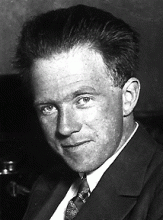Werner Heisenberg was born in Würzburg in 1901 the son of Dr. August Heisenberg and his wife Annie Wecklein. In 1920 he began studying physics at the University of Munich under Sommerfeld Wien Pringsheim and Rosenthal. In the winter of 1922–1923 he went to Göttingen to study physics under Max Born Franck and Hilbert. He took his Ph.D. in 1923 and became Born’s assistant. He was then awarded a Rockefeller grant which between 1924 and 1925 allowed him to work at the University of Copenhagen with Niels Bohr.
In 1926 Heisenberg was appointed Lecturer in Theoretical Physics at the University of Copenhagen under Bohr and in 1927 he was appointed Professor of Theoretical Physics at the University of Leipzig. For his work on the theory of quantum mechanics Heisenberg was awarded the Nobel Prize for Physics in 1932. Over the span of his career he was also awarded several other prizes and honorary doctorates.
In 1941 Heisenberg was appointed Professor of Physics at the University of Berlin and Director of the Kaiser Wilhelm Institute for Physics. During the Second World War he headed German efforts in nuclear fission research which failed to develop a nuclear reactor or atomic bomb. At the end of the war, Heisenberg and other German physicists were taken prisoner by American troops and sent to England.
Heisenberg returned to Germany in 1946 and helped to reorganize the Institute for Physics at Göttingen which was renamed the Max Planck Institute for Physics. In 1953 he became President of the Alexander von Humboldt Foundation. Beginning in 1958 Heisenberg was Professor of Theoretical Physics at the University of Munich.
Heisenberg is best known for his principle of uncertainty or indeterminacy principle, which states that it is impossible to determine with arbitrarily high accuracy both the position and momentum (essentially velocity) of a subatomic particle like the electron. In the later part of his life Heisenberg also worked on problems of plasma physics and thermonuclear processes and established a close collaboration with the International Institute of Atomic Physics at Geneva where he was for several years chairman of the Scientific Policy Committee.
Heisenberg married Elisabeth Schumacher in 1937 and they had seven children. He died in 1976.



